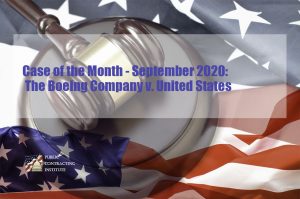PCI has started a new webinar series, the Case of the Month Club. Each month PCI’s Government Contracts law experts will discuss one or two recent cases. The second September case is The Boeing Comany v. United States. If you want to learn more about the Case of the Month Club, click here.
The Boeing Company v. United States
United States Court of Appeals for the Federal Circuit
Decided August 10, 2020

Facts: Boeing has held numerous DoD contracts since 1992. In 2011, Boeing permissibly changed its cost accounting standards. Some changes raised costs, other changes lowered costs. DCMA, citing FAR 30.606, demanded that Boeing pay the government for the increased costs across a series of contracts. FAR 30.606 requires contractors to ignore cost-lowering changes but apply cost-increasing changes when determining costs for existing contracts. Boeing filed suit at COFC, arguing that 41 U.S.C. § 1503(b) allows them to apply both cost-lowering and cost-increasing changes if the changes are made simultaneously.
The trial court held that Boeing had waived its claim by failing to protest the inclusion of FAR 30.606 prior to award. It also held that it lacked the jurisdiction to consider Boeing’s money exaction claim. Boeing appealed the decision to the Federal Circuit.
Issue: Do protesters need to protest the inclusion of contract elements prior to award, even if it is outside the contracting officer’s power remedy?
Can COFC review a money exaction claim under the Tucker Act?
Holding: A contractor does not need to raise an issue pre-award if the issue is outside the agency’s authority to correct.
The Tucker Act allows COFC to review an illegal exaction claim if the contractor is claiming the government has violated a statute in demanding the money.
Reasoning: Under Blue & Gold Fleet, L.P. v. United States, “a party who has an opportunity to object to the terms of a government solicitation containing a patent error and fails to do so prior to the close of the bidding process waives its ability to raise the same objection subsequently in a bid protest action in the Court of Federal Claims.” However, in this case, the inclusion of FAR 30.606 in the contract was mandatory, and the contracting officer could not have chosen not to include it. Additionally, neither the GAO or COFC could have granted relief at the bid protest step. Therefore, CAFC concludes, Boeing could not have corrected the error at the pre-award protest step. Since Boeing could not have corrected the error through a pre-award protest, the court does not think it waived its opportunity to object to FAR 30.606 through the Blue & Gold waiver rule.
Under the Tucker Act, a contractor can recover for an illegal exaction “when the plaintiff has paid money over to the Government . . . and seeks return of all or part of that sum’ that was improperly paid, exacted, or taken from the claimant in contravention of the Constitution, as statute, or regulation.” In these instances, subject matter jurisdiction will exist unless the claim is clearly frivolous or without merit. In this instance, Boeing paid $1,064,773 in direct violation of 41 U.S.C. § 1503(b).
COFC made its initial decision based on Norman v. United States, which held that the Tucker Act requires that the exaction itself provides the remedy for its violation through the return of money. This opinion states that Norman applied to a different narrow situation and has since been superseded by cases that allow jurisdiction over illegal exaction cases without regard to whether the statute provides a remedy for its violation.
